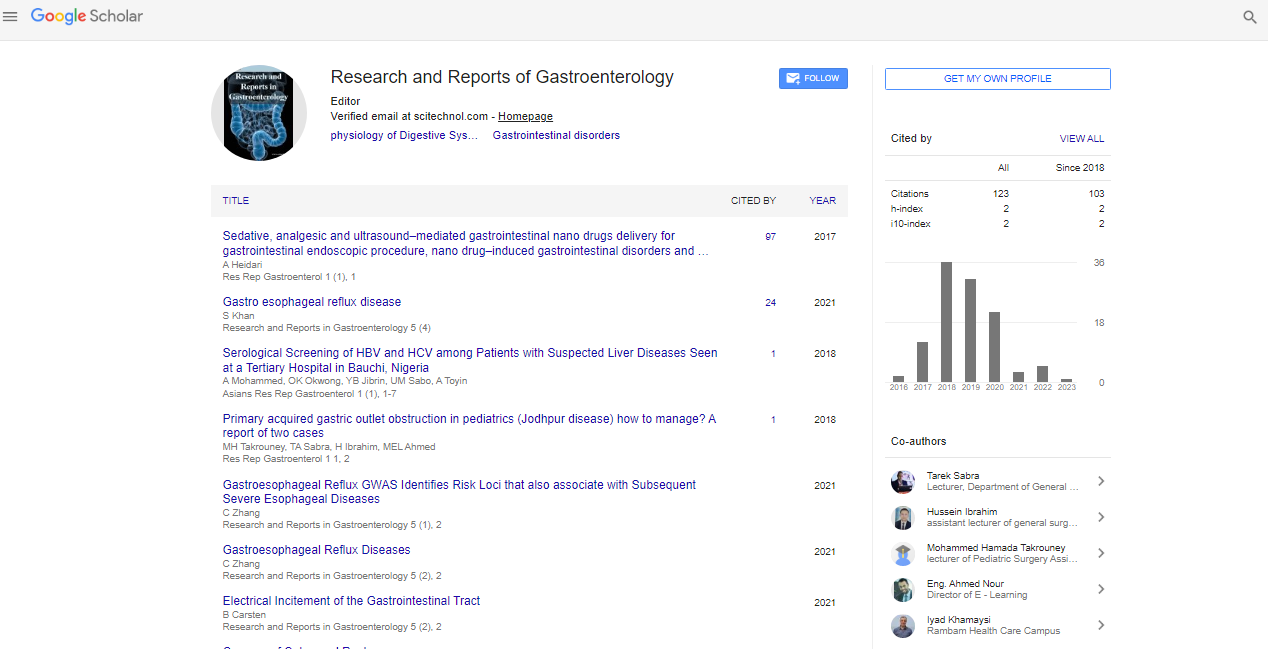Opinion Article, Res Rep Gastroenterol Vol: 7 Issue: 1
Intestinal Diseases Mechanisms of Action and Clinical Applications
George Hamilton*
Department of Dermatology, University of Pretoria, Pretoria, South Africa
*Corresponding author: George Hamilton
Department of Dermatology, University of Pretoria, Pretoria, South Africa
Email: hamilton_g@ned.za
Received date: 20 February, 2023, Manuscript No. RRG-23-97819;
Editor assigned date: 22 February, 2023, PreQC No. RRG-23-97819 (PQ);
Reviewed date: 08 March, 2023, QC No. RRG-23-97819;
Revised date: 15 March, 2023, Manuscript No. RRG-23-97819 (R);
Published date: 23 March, 2023, DOI: 10.4172/Rrg.1000131
Citation: Hamilton G (2023) Intestinal Diseases Mechanisms of Action and Clinical Applications. Res Rep Gastroenterol 7:1.
Description
Intestinal diseases refer to any medical condition that affects the gastrointestinal tract. The gastrointestinal tract is a complex system responsible for digesting food, absorbing nutrients, and eliminating waste. There are various types of intestinal diseases, and they can range from mild to severe. Some common examples of intestinal diseases include Irritable Bowel Syndrome (IBS), Crohn's disease, ulcerative colitis, and celiac disease. This article will explore the mechanisms of action and clinical applications of these diseases.
Irritable Bowel Syndrome (IBS) is a common disorder that affects the large intestine. It is characterized by a group of symptoms, including abdominal pain, bloating, gas, diarrhea, and constipation. The exact cause of IBS is not known, but it is believed to be related to abnormalities in the way the muscles of the intestine contract, leading to pain, diarrhea, or constipation. There is no cure for IBS, but treatment typically involves managing symptoms through dietary changes, stress management, and medication.
Crohn's disease is an Inflammatory Bowel Disease (IBD) that can affect any part of the digestive tract. It is characterized by inflammation of the lining of the digestive tract, leading to symptoms such as abdominal pain, diarrhea, and weight loss. The exact cause of Crohn's disease is not known, but it is believed to be related to a combination of genetic and environmental factors. Treatment for Crohn's disease typically involves a combination of medication and lifestyle changes.
Ulcerative colitis is another IBD that affects the large intestine. It is characterized by inflammation and ulcers in the lining of the colon and rectum. Symptoms of ulcerative colitis include diarrhea, rectal bleeding, abdominal pain, and weight loss. Like Crohn's disease, the exact cause of ulcerative colitis is not known, but it is believed to be related to a combination of genetic and environmental factors. Treatment for ulcerative colitis typically involves medication, dietary changes, and sometimes surgery.
Celiac disease is an autoimmune disorder that affects the small intestine. It is characterized by intolerance to gluten, a protein found in wheat, barley, and rye. When someone with celiac disease consumes gluten, their immune system responds by attacking the lining of the small intestine, leading to damage and malabsorption of nutrients. Symptoms of celiac disease include diarrhea, abdominal pain, and bloating. Treatment for celiac disease involves strict adherence to a gluten-free diet.
The mechanisms of action for these intestinal diseases vary, but they all involve some form of inflammation or damage to the lining of the gastrointestinal tract. In the case of IBS, the exact cause of the inflammation is not known, but it is believed to be related to abnormal contractions of the intestinal muscles. In Crohn's disease and ulcerative colitis, the inflammation is believed to be caused by an overactive immune system, which mistakenly attacks the lining of the digestive tract. In celiac disease, the immune system attacks the lining of the small intestine in response to the presence of gluten.
The clinical applications of these diseases are also varied. IBS is a relatively common disorder that affects up to 15% of the population. While it is not life-threatening, it can significantly impact quality of life. Treatment for IBS typically involves managing symptoms through dietary changes, stress management, and medication.
Crohn's disease and ulcerative colitis are both chronic diseases that can lead to serious complications if left untreated. Treatment for these diseases typically involves a combination of medication and lifestyle changes. In severe cases, surgery may be necessary to remove damaged parts of the digestive tract. Despite treatment, these diseases can be difficult to manage, and patients may experience periods of remission and flare-ups throughout their lives.
 Spanish
Spanish  Chinese
Chinese  Russian
Russian  German
German  French
French  Japanese
Japanese  Portuguese
Portuguese  Hindi
Hindi 